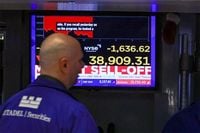The CAC 40 started a black session on Monday, April 7, 2025, as Donald Trump said on Sunday, April 6, 2025, he was not concerned about the plunge in the markets. European stock exchanges are down sharply this Monday after new comments from Donald Trump in the direction of a trade war whatever the cost. The CAC 40 index fell by more than 6% at the opening before recovering in mid-session to -4.34%. The Frankfurt Stock Exchange fell by 5.75% after briefly falling by more than 10%, London by 5.21%, Milan by 6.37%, and the Swiss Stock Exchange by 6.51%.
The American president has warned foreign governments that they would have to pay "a lot of money" to lift the vast tariffs decided by Washington, describing these taxes as a "medicine" and indicating that he was not concerned about the plunge in the financial markets. Over 50 countries have contacted the White House to start trade discussions, yet some have opted for retaliation, like China, while others, such as the European Union, are preparing for potential fallout.
Economists at Barclays have warned that "the reset of the global order by Trump 2.0 leads to chaos. Tariffs are synonymous with recession, and political uncertainty will not disappear." They added that "reciprocal tariffs and retaliation are recessionary." The consequences could be particularly negative for Europe, hindering the recovery of economic growth, as the new 'basic' tariffs of 10% on all imports into the United States imposed by Trump came into effect on Saturday, April 5, 2025. The 'reciprocal' tariffs are due to come into effect on Wednesday, April 9, 2025.
Gilles Guibout, head of European equities at AXA IM, noted in a Friday report that "over the next few weeks, the lifting of uncertainty regarding tariff implementation will not necessarily allow equity markets to recover, as the economic slowdown is now a certainty and will inevitably lead to a downward revision of corporate earnings." In Asia, the Tokyo Stock Exchange fell by 6.6%, weighed down by the financial sector, which is suffering from recession fears caused by the trade war.
The Hong Kong Hang Seng index declined by 12.27%, the Shanghai SSE Composite fell by 7.68%, and the CSI 300 lost 7.29%. On Wall Street, the New York Stock Exchange fell for the second consecutive day on Friday, April 4, 2025, in reaction to the trade war triggered by Donald Trump and the response announced by China. The Dow Jones index fell 2,231.07 points, or 5.50%, to 38,314.86 points. The broader S&P-500 lost 322.44 points, or 5.97%, finishing at 5,074.08 points, its lowest level in eleven months. The Nasdaq Composite fell 962.82 points or 5.82% to 15,587.79 points, down more than 20% from its last closing peak at 20,173.89 points on December 16, 2024, which technically puts it into bear market territory.
Chinese companies listed in the United States, such as JD.com, Alibaba, and Baidu, fell by more than 7.7%, while companies heavily dependent on China also suffered, like Apple, which lost 7.3%. The flight to safe assets affects U.S. yields, while the market now leans towards a Federal Reserve interest rate cut as early as May.
This "earthquake" has delayed many initial public offering (IPO) projects worldwide and weighs on mergers and acquisitions (M&A) operations. The Swedish fintech specialist in fractional payments, Klarna, and the American neobank, Chime, have canceled their IPOs, according to sources close to the matter. The ticket reseller StubHub, which was due to start its presentation tour to investors next week for its already delayed IPO, postponed its plans last Thursday, April 3, 2025, by at least a week. The financial services company eToro, based in Israel, has also postponed presentations to investors for its IPO on Wall Street, initially scheduled for Monday, April 7, 2025, to after April 20, 2025, due to market conditions and volatility.
A seasoned banker remarked, "It will be very difficult to carry out an operation to completion, as the cost of debt is expected to rise, making it harder to evaluate companies." The trade war initiated by the American president and its consequences are weighing on the U.S. and Australian dollar, while the euro appreciates. The dollar is down 0.5% against a basket of reference currencies, the euro is up 0.49% to $1.1009, and the pound sterling is up 0.17% to $1.2912. In Asia, the yen is down 0.86% to 145.64 yen per dollar, and the Australian dollar is down 0.6% to $0.6005.
Oil prices are also down on Monday, extending their losses from last week, as the escalation of trade tensions between the United States and China raises fears of a recession that would dampen oil demand. Brent crude is down 2.65% to $63.84 a barrel, while American light crude also sees declines.
As the global markets react to the ongoing trade war and its implications, experts caution that the uncertainty surrounding tariffs and economic stability will continue to challenge investors and economies worldwide.




